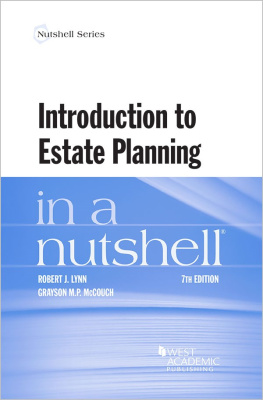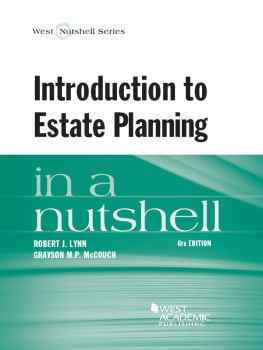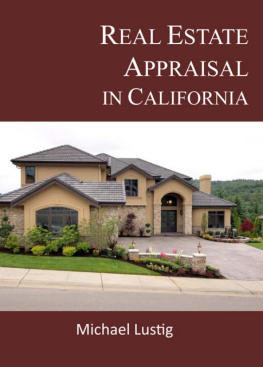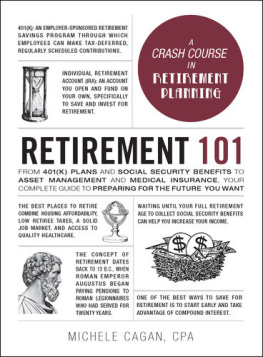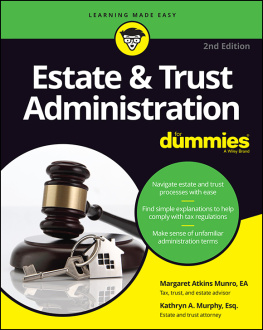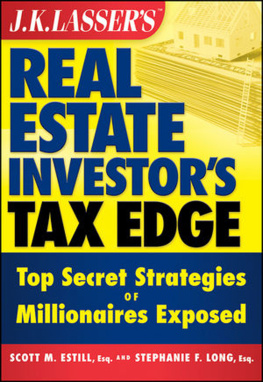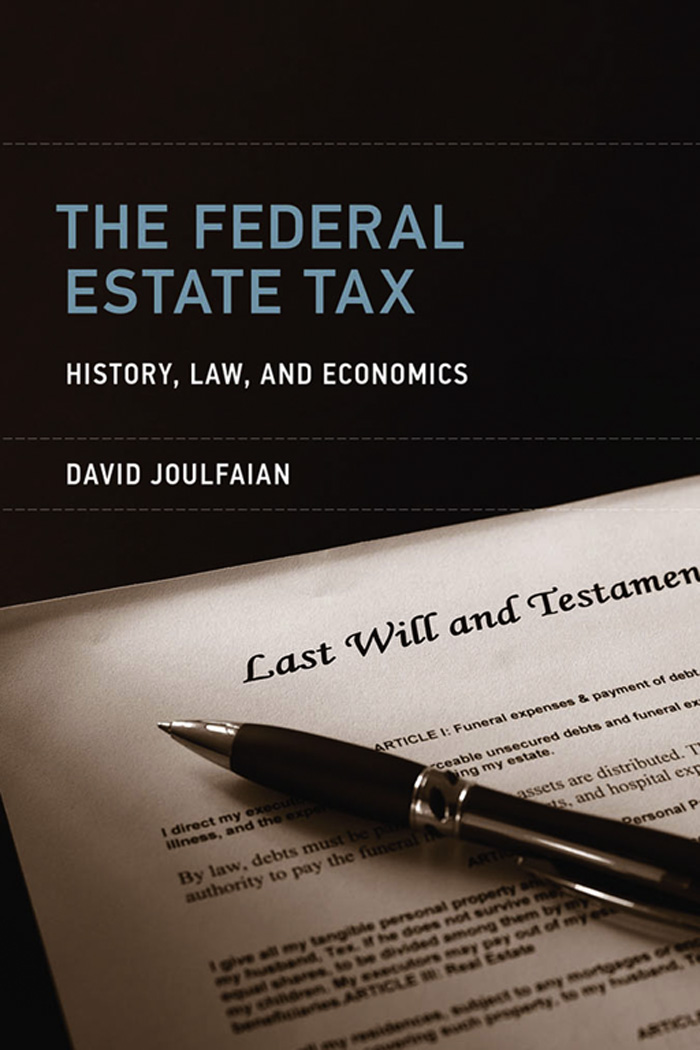
The Federal Estate Tax
The Federal Estate Tax
History, Law, and Economics
David Joulfaian
The MIT Press
Cambridge, Massachusetts
London, England
2019 Massachusetts Institute of Technology
All rights reserved. No part of this book may be reproduced in any form by any electronic or mechanical means (including photocopying, recording, or information storage and retrieval) without permission in writing from the publisher.
This book was set in Palatino LT Std by Toppan Best-set Premedia Limited. Printed and bound in the United States of America.
Library of Congress Cataloging-in-Publication Data
Names: Joulfaian, David, author.
Title: The federal estate tax : history, law, and economics / David Joulfaian.
Description: Cambridge, MA : The MIT Press, [2019] | Includes bibliographical references and index.
Identifiers: LCCN 2018055026 | ISBN 9780262042666 (hardcover : alk. paper)
Subjects: LCSH: Inheritance and transfer tax--United States.
Classification: LCC HJ5805 .J68 2019 | DDC 336.2/760973--dc23 LC record available at https://lccn.loc.gov/2018055026
10 9 8 7 6 5 4 3 2 1
To Alex, Ani, Dave, and Steph
d_r0
Contents
Preface
The estate tax is arguably one of the most neglected taxes. Aside from legal scholarship and practice, there is very little in the way of study of the tax by academics. And so, not surprisingly, much less of the structure of the tax and its consequences are familiar to the population at large as well as to many policymakers.
There is an obvious void in the study of the estate tax and the general understanding of its scope. In an attempt to fill this void, this book provides a description of the tax, its historic evolution, and a review of its economic consequences in a format that is accessible and yet comprehensive. There is no judgment on my part on the pros and cons of estate taxation, as this would require the difficult task of addressing an alternative source of revenues as well as the compromises that policymakers have to make in choosing from estate, corporate, and personal taxes and excises to fund their programs. Nevertheless, the book addresses many aspects of the estate tax to help guide readers in learning about the tax.
I have been fortunate to have served as an economist at the U.S. Department of the Treasury, Office of Tax Analysis, where the constant flow of tax proposals and discussions on tax-related matters have influenced the writing of this book. Five anonymous reviewers provided extensive and insightful comments that have shaped the manuscript. My colleagues at Treasury and coauthors on a number of estate taxrelated papers have provided critical feedback on many aspects of the presentations in the book. I have greatly benefited from the wisdom and legal scholarship of Katherine Hughes. And at the MIT Press, Emily Taber, Laura Keeler, and Virginia Crossman have been helpful throughout the process of getting this manuscript published. Nathan Born, Parisa Manteghi, Roman Mookerjee, Siobhan OKeefe, and Anna Rakhman have provided invaluable research assistance over the years. The views expressed in this manuscript are mine alone, and should not in any way be attributed to the U.S. Department of the Treasury.
1
Introduction
Taxes take a variety of forms, and include levies on individual and business income, personal expenditures, and wealth. Often governments design tax systems and levy taxes for reasons other than to just fund their programs and operations. Indeed, the form and reach of some of the taxes imposed are designed, among other purposes, to shape behavior as in the case of the income tax deduction for charitable giving or the case of tobacco taxes, and to reflect on the ability to pay as well as to correct for inequalities in the income distribution as in the case of progressive income taxes and wealth levies. The latter may take the form of annual wealth taxes and inheritance taxes typically applied to the wealthiest of estates. The ensuing tax system unavoidably reflects a set of compromises by governments and the difficult choices its legislators encounter, as they levy taxes on their constituencies when they are raising and educating their children, starting or expanding a business, during their retirement years, and after their death.
Inheritance taxes represent one of the oldest forms of taxation. Such taxes may be traced back to ancient Egypt, during the reign of Psametichusi in the seventh century BC. A tax on inheritances was also introduced by the Romans some two thousand years ago. Reflecting on the difficult choices that policymakers have to make, and faced with the prospect of having a land tax levied instead to provide for housing for veterans, in the year AD 6 the Roman Senate approved Emperor Augustuss proposed inheritance tax, the vicesima hereditatium, as an alternative source of funding.
Inheritance taxes take several forms, and are often labelled as death duties or death taxes because they typically apply after the death of the wealth holder. Inheritance tax rates may vary by size of the monetary transfer and type of relationship between the deceased and the heir. These taxes may be paid by each beneficiary after receiving an inheritance, or alternatively can be paid by the estate of decedents with the total tax liability determined by the size of the bequests to each beneficiary. Inheritance taxes may also take the form of an estate tax for which the tax liability is determined by the size of wealth held by the estate irrespective of the nature of the beneficiaries, with after-tax wealth distributed to the heirs. The modern variant of these taxes also applies to wealth transfers during life in the form of gift taxes aimed primarily at preempting tax avoidance.
Death taxes took the form of feudal charges or payments to the lord or sovereign during the Middle Ages. By 1694, and burdened by the cost of the French Wars, England enacted a stamp tax that applied to legal documents related to the probate of wills; this required the purchase of a stamp in the amount of five shillings in case of personal property worth over twenty pounds. The stamp tax was converted in 1796 into a tax on the value of transfers of personal property applied at tax rates ranging 2 to 6 percent depending on the nature of the relationship of the heirs. The tax, often referred to as a legacy tax, was modified over the years and evolved into an estate duty that applied to all assets held at death by 1894.
In the formative years of the American Republic, a very limited array of revenue sources was available to the federal government. These primarily included custom duties, sale of public land, and select excises. To raise additional revenues, especially at times of crises, the federal government experimented with different forms of inheritance taxes. It enacted the Stamp Act of 1797, a tax in a way similar to the English taxes imposed on receipts from personal estates, before eventually also settling on the estate tax in 1916 that extends to all property held at death.
The tax evolved over the years into the federal unified transfer tax, which is more commonly referred to as simply the estate tax. It currently consists of the estate tax that applies to wealth held at death, the gift tax that applies to lifetime transfers, and an additional generation-skipping transfer tax (GSTT) that applies to both bequests at death and gifts made during life to grandchildren and other beneficiaries that skip a generation. Following general practice, the federal unified transfer tax hereafter will often be referred to as the estate tax. It is the only form of wealth taxes levied by the federal government.
Next page

